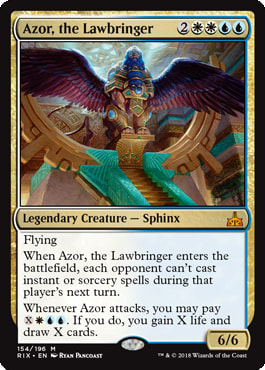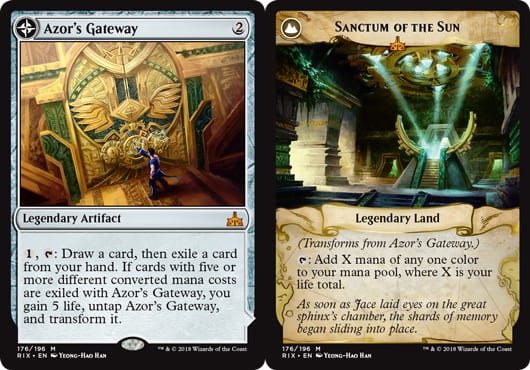The first Ixalan set came with a bit of a thud. The majority of the cards were far too underpowered and the typal themes weren't strong enough, which made for a rather lackluster Limited environment. Rivals of Ixalan continued this trend to a degree, but this time it brought along tons of powerful new cards, an excellent setting, and a top notch Magic story. It also happens to play host to tons of awesome mythic rares - thirteen in total this time around! As is usual, we're ranking them all today! Let's dive in!
Number Thirteen
The first Ixalan's Huatli didn't seem that great, but it at least provided some reasonably aggressive gameplay by making a big creature every turn. This one does nothing if you don't have creatures to back it up, and that's not an exaggeration. Even if you do have a creature, that -1 ability does little if the creature doesn't have evasion. All of this made this Huatli practically unplayable in most scenarios, and easily made it a contender for the worst mythic of the set.
Number Twelve
There was some fairly real hype around Trapjaw Tyrant when it first got previews. Getting to Banisher Priest a creature over and over while simultaneously picking off blockers or dishing out big damage seemed awesome. In practice, this only ended up being really good in Limited. Everywhere else, though, it ended up being too easy to pick off or - in the case of Commander - too easy to just let the damage go through. As such it was left stranded and saw play practically nowhere besides the most dedicated of dinosaur Commander decks.
Number Eleven
Getting an extra turn is always an awesome thing. Getting to potentially do it multiple times off a single card? That's playing with fire. Timestream Navigator straddled the line quite well here, though, by way of being limited by summoning sickness and a fairly frail and feeble body. As a result, the card has proven to be a fun casual addition to extra turn decks in Commander, but little else truly wants to utilize it. Additionally, just a few months after this set's release came the release of Nexus of Fate, which meant this card simply never had a chance in Standard.
Number Ten
By the time Rivals of Ixalan released, it had been roughly four years since Sphinx's Revelation left Standard. Players loved the card and despite the recency, there was already plenty of nostalgia attached to it. So how did WotC utilize this? Simple, put it onto a legendary creature in such a way that you could do it every turn! The execution of the design meant that Azor never saw any real competitive play, but the Ravnica parun became a fan favorite design that let players live the dream if they wanted.
Number Nine
When this card was first previewed, players were blown away by just how much mana the backside of this card could make. The big hang up was how you needed to loot away several cards over multiple turns to get there in the first place. It didn't do much in Standard outside of a handful of control decks, but it lives on as a popular Commander card among those who want to try living the dream of generating absurd amounts of mana with a single card.
Number Eight
Angrath is a Constructed card through and through and he definitely put in some serious work during his time with Standard. The card was far more of a roleplayer than a top format contender, but when he showed up, you know he meant business. It wasn't difficult to rip away your opponent's best creature or repeatedly tear apart your opponent's hand as they slowly got drained away. The card just happened to be more situational than, say, Chandra, Torch of Defiance which was also around at the time, making it a wholly middle of the road mythic, but a good one at that.
Number Seven
I'd argue that Polyraptor isn't really that great of a card and I think most players would agree. That said, the design seemed cool and unique enough to try building by a deck around it. Turns out you could actually go infinite with it using Frontrunner of the Empire. Polyraptor would enter the battlefield, Frontrunner would deal a damage to it, you'd get a Polyraptor clone, then Frontrunner would trigger, and on and on it goes. It didn't really have a solid way to actually close out games and was little more than silly casual nonsense but it made for a very interesting card at the time.
Number Six
There was a ridiculous amount of hype surrounding Kumena at the time as it looked like a truly serious payoff card for Merfolk decks. This made it initially the most card in the set by a lot. As the Standard format evolved and settled, though, it didn't actually do anything and became little more than Commander fodder that slowly but surely crashed in price. To this day, though, it remains one of the best options for a Simic merfolk Commander deck and boasts a fairly high popularity rating on EDHREC.com as a result because it just kind of does everything you want out of a merfolk commander.
Number Five
For some time, Edgar Markov seemed like not only the best vampire commander but arguably the only one. He was simply that good at what he did and the sentiment continues among some even to this day. Elenda came out and proved you didn't need to go all in on such a powerful legend to build a good vampire deck. As you pick off creatures - including your own - you make Elenda huge, where she brings in the beats. Then if she dies, you make a ton of tokens that make for great fodder for when you recast her.
Number Four
This card just does everything! On their own, most of these effects are a little middling depending on the card they're attached to. When you put them all on a single card, though? That makes for one hell of a casual all-star! Commander decks everywhere go nuts for all of these effects stapled together that only benefit you. Getting to shut down your opponents' planeswalkers only makes the card that much better, as you can build or play around it yourself while potentially completely stopping your opponents' game plans dead in its tracks.
Number Three
Typically when writing out these mythic rankings lists, I like to put a big emphasis on the cards that ended up being major Standard all-stars. As far as those go for Rivals of Ixalan, Rekindling Phoenix is king. It was a lynchpin of the era's Red Aggro decks that provided a huge evasive threat that was extremely difficult to get rid of. In reality, the card never felt super great even among its contemporaries with cards like Glorybringer and Chandra, Torch of Defiance also in the mix still. That's why I'm only putting it at third, but there's no doubt that it's far and away the best competitive mythic of this set.
Number Two
One of the most powerful creatures of all time is Dark Confidant, the Invitational card of Bob Maher that proved one of the best draw engines in Black decks for years. Numerous variations on the design were made, but most failed. Twilight Prophet was the latest of these designs but had a twist: your opponents lost the life for your draw instead of you! Because of the high cost, the card never saw much competitive play, but because it hit each opponent and not just one, it became an instant staple of Commander. The card was a classic right from the get go and to this day remains an incredible casual favorite.
Number One
Few cards encapsulate the energy of casual Commander more strongly than Zacama. Dinosaurs were and remain extremely popular among the casual crown and Zacama just does everything and then some. It's gigantic, untaps your lands - effectively making it free, and have several powerful abilities to boot. It's not hard to see the appeal even to the most diehard competitive player and even if its not the most outright powerful option, it's far and away the coolest. An easy pick for the top mythic of this set.
Paige Smith
Twitter: @TheMaverickGal
Twitch: twitch.tv/themaverickgirl
YouTube: TheMaverickGal




































